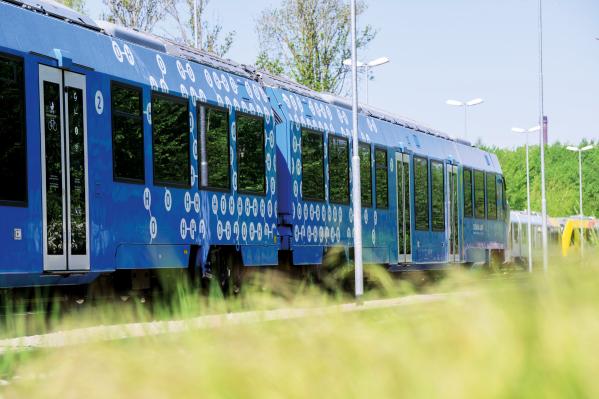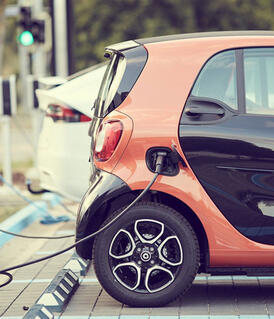For the mobility of the future

Transforming the transport system is an essential element of achieving climate protection goals in Germany and around the world. For this to happen, there will need to be substantial reductions to harmful emissions from the transport sector in the 2020s. The Federal Government Federal Government The Federal Government and cabinet is made up of the Federal Chancellor and the Federal Ministers. While the Chancellor holds the power to issue directives, the ministers have departmental powers, meaning that they independently run their respective ministries in the framework of those directives… Read more › therefore wants to encourage work on alternative fuels and expand the rail and cycling infrastructure. The long-term goal is to completely decarbonise the transport sector.
Getting more electric cars onto the roads
In 2025, there were around 1.6 million electric cars in Germany. The Federal Government Federal Government The Federal Government and cabinet is made up of the Federal Chancellor and the Federal Ministers. While the Chancellor holds the power to issue directives, the ministers have departmental powers, meaning that they independently run their respective ministries in the framework of those directives… Read more › is supporting the expansion of electric mobility. At the same time, the charging station infrastructure is being expanded. Germany is cooperating with its EU partners on this: from 2035, it will no longer be possible to register a new petrol or diesel car anywhere in the EU. The Federal Government also wants Germany to become the leading market for driverless vehicles and to this end is working with the federal states Federal states Germany is a federal state. Both the central federal government and the 16 federal states have independent areas of jurisdiction. The government in Berlin is responsible for foreign policy, European policy, defense, justice, employment, social affairs, tax and health. The federal states are… Read more › to develop model regions.
Promoting battery cell manufacturing
Battery cell manufacturing is considered a key industry for electrical transportation, as powerful batteries are needed to allow electric cars to drive long distances and charge quickly. The Federal Government Federal Government The Federal Government and cabinet is made up of the Federal Chancellor and the Federal Ministers. While the Chancellor holds the power to issue directives, the ministers have departmental powers, meaning that they independently run their respective ministries in the framework of those directives… Read more › intends to make Germany a “Centre for Battery Research, Manufacture and Recycling”. Germany is working closely with other EU partners under the aegis of Important Projects of Common European Interest (IPCEI) to promote battery cell manufacturing, with numerous German firms taking part. Germany will invest over 13 billion euros by 2030 through IPCEI projects alone, while around 3 billion euros has been allocated to expand battery cell production for the period up to 2031.
National hydrogen strategy
The use of hydrogen and its derivatives will play a key role in decarbonisation efforts, especially when it comes to the transformation of the energy, transport and industrial sectors that will be taking place by 2030.
In all cases where electrification is not appropriate, for example in the chemical and steel industry, for heavy-duty commercial vehicles and, increasingly, in aviation and shipping.
The National Hydrogen Strategy, which was adopted by the Federal Government Federal Government The Federal Government and cabinet is made up of the Federal Chancellor and the Federal Ministers. While the Chancellor holds the power to issue directives, the ministers have departmental powers, meaning that they independently run their respective ministries in the framework of those directives… Read more › in 2020 and continued in 2023, aims among other things to accelerate the market ramp-up of hydrogen, its derivatives and application technologies. In addition, hydrogen and its derivatives are to be made available in sufficient quantities and an efficient hydrogen infrastructure built up.
Expanding rail and cycle transport
Railways are also to play an important role in tomorrow’s mobility. The Federal Government Federal Government The Federal Government and cabinet is made up of the Federal Chancellor and the Federal Ministers. While the Chancellor holds the power to issue directives, the ministers have departmental powers, meaning that they independently run their respective ministries in the framework of those directives… Read more › therefore wants to step up investment in the rail network. Cycling, as an integral form of sustainable mobility, is also to be encouraged.


